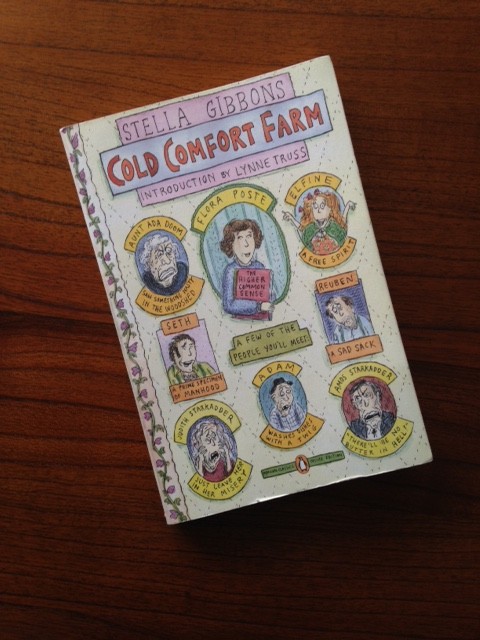COLD COMFORT FARM by Stella Gibbons first came to my attention in the form of the 1996 film staring Kate Beckinsale as heroine Flora Poste. Somehow, despite my love for all things English literature, I had not heard of the novel previously, nor did I manage to get my hands on a copy prior to actually going to see the film, which I found light and amusing and a very enjoyable way to pass a couple of hours. Since I’m firmly of the opinion that books beat out their film adaptations in the vast majority of cases, this was a strong recommendation for adding the novel to my to-read list, where it has unfortunately lingered for the best part of two decades. No apologies; I think I’ve established how far behind I am with my reading.
I finally picked up the book shortly after I finished reading MEN WE REAPED, because I was craving something very different and much less emotional, and COLD COMFORT FARM certainly met those qualifications. Gibbons tells the story of Flora Poste, who, upon being orphaned at nineteen, discovers her family was not nearly as well off as was supposed and that she needs to find a means of supporting herself beyond her measly one-hundred pounds annual income. Instead of taking up a profession — not uncommon for a woman in her circumstances in the early 1930s — she writes to all her distant family members to request they take her in, and so settles upon Cold Comfort Farm in Sussex. The book traces her trip to the farm, her encounters with a range of odd relatives and farm hands, and her determined approach to setting all and sundry onto what she firmly believes to be the proper courses for their lives.
Gibbons herself shared a similar background to Flora Poste. She had two younger brothers for whom she became responsible when her parents died, and she worked as a journalist in London from the late 1920s on as well as maintaining a secondary writing career as a novelist. Her own father had a temper and a drinking problem, and no doubt his colorful behavior and that of some of her other family members informed the characterizations of several male characters in Gibbons’s work. COLD COMFORT FARM offers an obvious parody of the novels of Thomas Hardy, D.H. Lawrence, and others who focused on nature and rural life, and which had long been popular, but it also speaks to determination and the ways in which an intelligent, educated woman might turn a situation to her advantage, something Gibbons knew full well. For all her bossiness and opinionated stances, Flora Poste accomplishes things; she turns Cold Comfort Farm on its ear, sending its residents scrambling in new directions, and they are all the better for her meddling.
There’s a great deal to like about COLD COMFORT FARM, which is filled with humorous dialogue and blatant innuendo, as well as a brilliant collection of charter names that extends from the humans to the farm animals — a bull named Big Business, and cows answering to Graceless, Feckless, Aimless, and Pointless, to name a few. Among the ridiculous, there are some moments of true insight regarding human behavior as Flora manipulates the people around her by playing to their truest needs and desires, often ignoring behavior she considers unnecessary or unreasonable. But there are a few ongoing questions that are never quite answered. Flora may get her resolution, but as a reader I felt more left out than amused.
Based on my experience with the film, I fully expected to love COLD COMFORT FARM, but the reality fell slightly short; I enjoyed it for its wit and cleverness and am happy to have finally read it, but it will not be joining the list of my most beloved reading experiences.

Leave a Reply